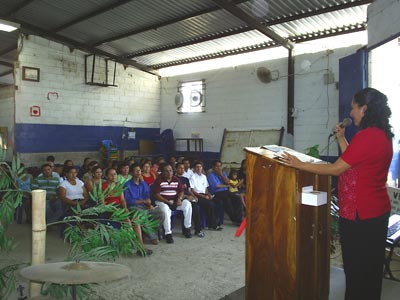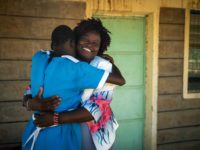It is a sunny Sunday morning in San Salvador. It is dry season.
Just as any other Sunday, there are people in the streets coming and going. Housewives with shopping bags going to the local outdoor market to buy the ingredients for lunch, families with their best garments coming from church, and kids going with balls to the park.
The air is filled with freshness and calm, and somehow the future seems brighter for many people going to the local church in the Majucla community.
In a neighborhood named Cuscatancingo, in a poor area of San Salvador, walls full of graffiti, stray dogs, and police and military forces are part of the normal landscape. There are also groups of teenagers with baggy pants and big shirts, some of them with tattoos. They are gang members just ‘chilling.’
In this neighborhood, there is a church named “Tabernaculo Biblico Bautista Majucla” or Baptist Biblical Tabernacle of Majucla. And on this day, at a little bit past 10 in the morning, there are over 100 people in the church.
There is a line outside of the church, and it is growing. The church is almost full. For anybody just passing by, this seems like the second service at the church, but it’s not. The message is a bit different because it is a monthly meeting that the center has with the parents of the children enrolled.
Brother Rodolfo, the pastor, isn’t sharing the message, but his wife Wendy, a respected woman in the community with vast experience in pedagogy, is.
The people attending these monthly meetings come from low-income families. Most of them do not have formal jobs. They survive making tortillas or selling vegetables at the local street market.
These meetings are an initiative in El Salvador called “school for parents,” and the initiative is being financed through a Complementary Interventions Fund (CIV).
CIV is a tool used to provide additional assistance to the families of the children registered in the Compassion programs.
“We come here to learn,” says Ana Luz, mother of Rosibel. “It is a blessing too, because my husband is not Christian, but he likes to come to the meeting.”
The purpose of a school for parents is to inform the parents what their children are learning, but also to have an opportunity to provide parents knowledge and tools that will help them in their role.

The Compassion centers have adopted this model and meet with the parents at least once every two months. In the case of Tabernaculo Biblico Bautista Majucla, they meet once a month.
The school for parents has been active since the beginning of the center, a little more than three years ago.
Just as in a school meeting, the parents get acquainted with the upcoming events at the center, they know when the next sponsor letter is due, and which children have received letters from their sponsors. There is also participation by either the pastor or a special guest, such as a medical doctor, a police officer, a firefighter, or a psychologist, who talks about a subject of interest for the parents.
The talks at the meetings touch issues from marital problems to good health practices for the family.
“We do not take our children with us for these meetings because they are a distraction, and some of the subjects are not appropriate for them,” says Ana Luz.
In fact, some of the subjects studied at these meetings teach the parents about the well-being, the trust, and the intimacy of couples.
“I believe that if the couple is ok, the children will also be ok,” says Sister Wendy, explaining that if the couple lives in an atmosphere of love and understanding, the children will also receive love.
There is also the spiritual component. The parents read the Bible, pray and sing hymns, and those seeds are starting to bear fruit.
“I was not Christian, and I did not want to know anything about church, but I liked to come to these meetings” says Dinora, mother of Laura.
Finally, the Bible studies given by the pastor at the school for parents penetrated Dinora’s heart, and she became a Christian.
“Since last December, I started attending church,” she adds.
The success of this program does not happen just because of the training and knowledge of the staff, but because of their love for the children and their families, and the commitment of the pastors and the church.
“We have spiritual help and material help,” says Sonia, mother of Edwin. “My children are learning about computers … [But also] I know that if one of them gets sick, I can come looking for the pastor and he will help me.”
This morning, Sister Wendy is talking about the psychological implications of a divorce in the lives of the children. After about 20 minutes she ends her talk with the words: “The best solution to face a divorce: to hold hard in the hands of the Lord.”
The staff plan the school for parents with love and enthusiasm, knowing that this will impact the lives of the children at a deep level.
Brother Nicolas, grandfather and caregiver of Brenda and Tatiana, shows his excitement for what he learned at the school for parents and for the efforts of the church to provide a good service, with integrity. “Whoever is not grateful with God for this blessing, and with the staff, is not being fair,” he says.







13 Comments |Add a comment
How can I get instruction for sending mail to Compassion for distribution to my child in Ecuador. I have been emailing through Compassion till now but want to send paper/gifts and photos now. I cannot find instructions for doing this any where.
Belle Thomas. (3377518)
Hi Belle! When sending physical letters and paper gifts, please remember to place your child’s name and number and your name and number on whatever you are sending. You may mail mail them to:
Compassion International
[No street address necessary]
Colorado Springs, CO 80997-0004
@Christi –
Yes you can send gifts for the project specifically. I would suggest calling Compassion to talk with them about the requirements and the process for that.
There is a post titled “Benson’s new classroom” that tells how a sponsor sent money to help build a classroom at his child’s project.
One of the things I love about Compassion is the Whole Family approach…and as I pray for my children, I pray for their families, and their projects.
Can we send a gift directly to the project for the project?
@Chris Giovagnoni –
Thanks for the info! It is interesting to see how everything works.
I think this is just an awesome story! I love hearing about ways that Compassion reaches out to the whole family and the community that surrounds the children they help.
It’s great that the centers are there for those children who don’t have anywhere else in their lives that’s safe and where they are loved and cared for, but if through the program, they can also start to have that feeling at home, so much the better!
Keep up the awesome work!
I’m not sure what the 52 stands for. It probably would be a good to know if you’re planing to buy the hat 🙂
@Tina –
Allen, that is a good point. I have seen that on my kids info sheets too.
I am wondering however if most of the projects fund the ministry to parents through the CIV like the project above, or if that is funded through the sponsorship funds. @Allen –
Good question! I don’t know the answer.
I love the title “School for Parents” — what a great way to reach out to the community. We’ve heard much about this in the projects we’ve visited in various countries, although it doesn’t always have that title.
Nice story – I love hearing how Compassion is helping entire communities through the ministry to the kids.
Also…I’m sure this isn’t the “right” place to ask this, but I’m curious if anyone knows what the 52 logo means for Compassion? There’s a new hat in the online store that has a 52 on it and I just wasn’t sure what it symbolized!
My sponsored children’s project information sections of their introductory packets (and on the website) list services provided to the children, and services provided to their parents. Each project seems to handle things a little differently, but the majority I’ve read offer some services to the parents.
For example, on Megha (a 3-yr-old in India currently available for sponsorship)’s profile, the infromation reads:
“Your sponsorship allows the staff of Jeevandhara Child Development Center to provide Megha with Bible studies, sports, deworming, vitamins, medical checkups, nutritious food, games, cultural programs, field trips, tutoring and school supplies.”
And then for parents…”The center staff will also provide meetings, income-generating programs, Bible studies and arts day programs for the parents or guardians of Megha.” @Sara Benson –
I love hearing about how compassion is helping the churches reach out to the adults in the community as well. Especially in how it provides an opportunity for parents who are not saved to come to know the Lord in a non threatening way.
Are meeting like this held just in El Salvador? Or in all of the church projects?
Sara,
I apologize for the delay in my reply. This is what I learned from International Program.